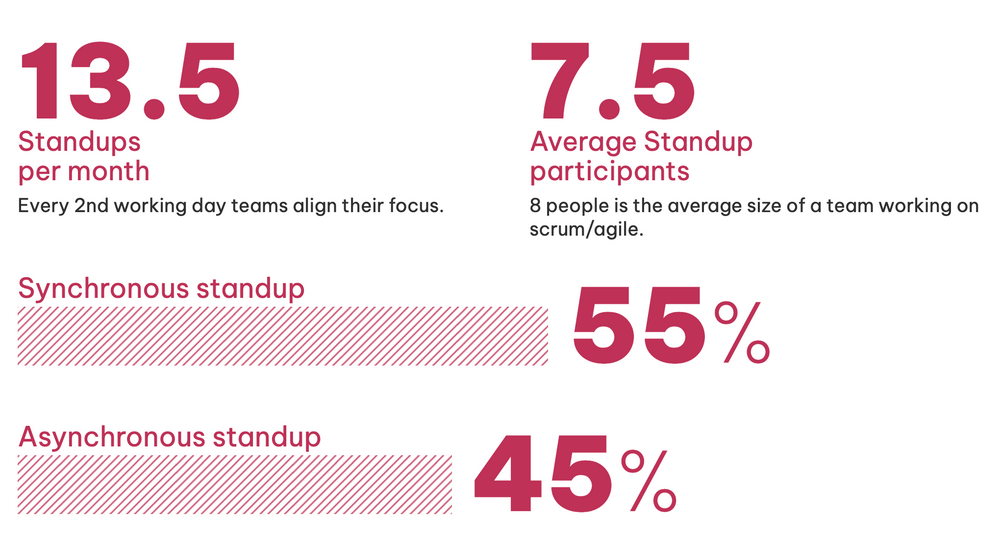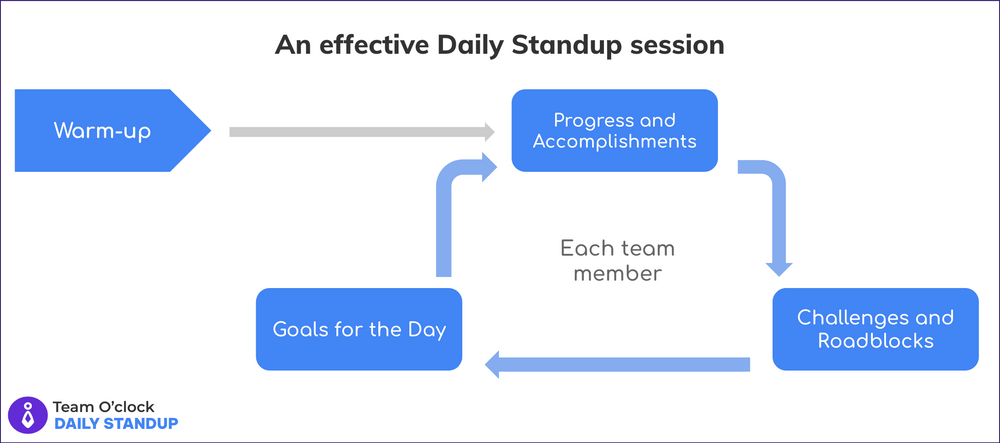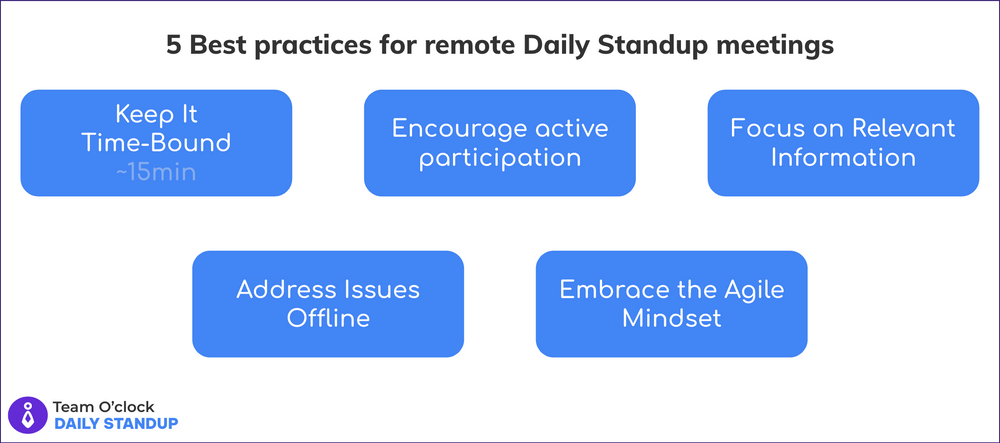
The Ultimate Guide to Daily Standup Meetings in Agile

In the dynamic world of Agile software development, effective communication and collaboration are essential for the success of a project. Daily standup meetings, also known as daily scrum meetings, are crucial in fostering teamwork, aligning goals, and ensuring transparency within Agile teams.
In this comprehensive guide, you will discover the intricacies of daily standup meetings, exploring their purpose, structure, best practices, and the benefits they bring to Agile teams.
What Are the Daily Standup Meetings?
Daily standup meetings are short, time-boxed gatherings held by Agile teams to synchronize their efforts and stay aligned with project goals. These meetings are typically held at the same time and place every day.
They involve team members briefly sharing updates about their progress, challenges, and plans for the day. Although the name implies standing, the reason behind it is to encourage brevity and focus.
What Is The Purpose of Daily Standups?
The primary purpose of daily standup meetings is to enhance communication, collaboration, and transparency on day-to-day tasks within Agile teams.
Daily standups facilitate early issue detection, problem-solving, and alignment toward achieving project objectives by providing a platform for team members to share their progress and obstacles. They also foster a sense of shared responsibility and accountability among team members.

This report provides insights on participants, synchronous and asynchronous standup duration, and the location preference of the chat apps for remote teams during daily stand-up meetings. It offers valuable data on the current state of agile practices within remote teams.
How to Set Up a Successful Daily Standup Meeting
Selecting the Right Participants
Include all relevant team members in the daily standup meetings. The team usually consists of individuals such as developers, testers, product owners, and Scrum Masters. It is vital to have individuals directly involved in the project to ensure effective coordination.
Determining the Time and Duration
If applicable, choose a time that works best for the entire team, considering their availability and time zone differences. The duration of a daily standup meeting for teams working in the same location or time zone should be kept short, ideally between 10 to 15 minutes, to maintain focus and prevent unnecessary delays.
For remote teams, the daily standup can last between 4 and 12 hours, so every team member has the chance to add their updates to the collaboration tool.
Choosing the Meeting Location
If the team is co-located, holding the meeting in a designated physical space, such as near the team's workspace or a conference room, can foster a sense of togetherness.
For remote teams, leveraging video conferencing tools and collaboration software ensures seamless participation regardless of geographical location.
How to Structure a Daily Standup Meeting
A well-structured daily standup meeting allows for effective communication and efficient time use. Here's a suggested format:
Start with a Warm-Up
Begin the meeting with a brief warm-up, allowing team members to converse casually. This helps build rapport and creates a positive atmosphere for the meeting.
Share Progress and Accomplishments
Each team member takes turns sharing what they have accomplished since the last meeting. They should focus on completed tasks, milestones reached, or any other relevant updates.
Discuss Challenges and Roadblocks
Team members communicate any challenges or roadblocks they are facing. Discussing as a team allows for assistance, collaboration, and potential solutions to emerge.
Set Goals for the Day
Finally, team members establish their goals for the current day. By openly stating their intentions, they nurture a shared understanding of each individual's priorities and facilitate coordinated efforts.

The 5 Best Practices for Daily Standup Meetings
To make the most of daily standup meetings, consider the following best practices:
1. Keep It Time-Bound
Respect the time constraint of the meeting and ensure that discussions remain focused on relevant topics. Encourage team members to have separate follow-up talks for more in-depth conversations or to address specific issues.
2. Encourage Active Participation
Every team member should actively participate by listening attentively and contributing meaningfully. This creates an inclusive environment where everyone's perspectives are valued.
3. Focus on Relevant Information
Emphasize the importance of sharing concise and relevant information during the meeting. Maintaining focus on critical updates and obstacles is essential, and concise communication is vital to achieving this objective.
4. Address Issues Offline
If issues require further discussion or resolution, encourage team members to address them outside the standup meeting. That way, they stay focused and do not get sidetracked by lengthy problem-solving discussions.
5. Embrace the Agile Mindset
Promote the Agile values and principles throughout the daily standup meetings. Encourage collaboration, transparency, and adaptability among team members to foster an Agile mindset.

5 Benefits of Daily Standup Meetings
Daily standup meetings offer several benefits to Agile teams. Here are some of the key advantages:
Improved Communication and Collaboration
Team members develop a deeper understanding of each other's work by regularly sharing updates and discussing challenges. Improving communication and promoting collaboration among team members can significantly contribute to success.
Enhanced Team Productivity
Daily standup meetings help identify and resolve roadblocks promptly, ensuring team members can work efficiently. The increased transparency and alignment lead to improved productivity and timely delivery of project milestones.
Early Identification of Issues
Team members can identify and address issues early in development through daily standups. This is how they can prevent escalating problems and allow for swift corrective actions.
Increased Transparency and Accountability
The transparent nature of daily standup meetings fosters a culture of accountability. Team members become more aware of their responsibilities and feel empowered to take ownership of their tasks.
Quick Adaptation to Changes
Daily standup meetings facilitate the early detection of changes in project requirements or priorities. This way, Agile teams can adapt swiftly and adjust their plans to accommodate new information or evolving customer needs.
Conclusion
Daily standup meetings are integral to Agile methodologies, promoting effective communication, collaboration, and transparency. By following the best practices outlined in this guide, Agile teams can maximize the benefits of daily standups and ensure the success of their projects.

More articles to check

Assist your team's growth with our partnership program:








